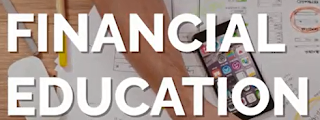Financial literacy is an essential life skill. During the past year, there has been significant growth in the number of U.S. students taking personal finance classes. Some have called this increase in financial education a movement, even an “inflection point”; i.e., a time of significant change and progress.
I recently attended several webinars and virtual meetings about financial education and participated as a panelist on a Twitter chat about the role of financial education in adult financial well-being sponsored by the University of Chicago Financial Education Initiative.
Below are eight of my key take-aways about financial education from these programs:
Doing Nothing is Not a Good Option- Costs result
from a lack financial literacy. As I noted in a 2013
blog post, they include forgone savings and
investment opportunities, lives shattered by financial loss or bankruptcy,
higher prices than necessary paid for goods and services, dreams and
aspirations that go unfulfilled, and marital discord about money. The
collective loss in dollars resulting from common financial errors is a big
number.
“Improvement Paradigm” Outcomes- Instead of
focusing on very specific financial goals (e.g., saving $1,000) as outcomes to
measure the success of a program, focus on progress that people make over time.
If they are moving the needle in the right direction and making small incremental
progress steps over time, count that as a “win.” Achieving small financial successes
can inspire people to go on to do bigger and better things.
FinTech is Not a Substitute for Financial Literacy- There is no
shortage of fintech apps today to help manage your finances. For the most part,
this is a good thing and they appeal to tech savvy young adults. Fintech is not
a substitute for financial literacy, however. It is a compliment. People still
need to understand basic financial concepts and skills such as reconciling a
checking account balance and preparing a budget.
Youth Respond to “Right Now” Topics- Focus youth
financial education around what they need to know today rather than their life
in the future. Information will be more relevant and better received. That
said, help young adults connect their present day decisions to future outcomes.
One of the most important topics to teach teenagers is the awesome power of compound
interest and long-term investing.
Avoid “No” and “Don’t” Language- It is human
nature for youth (and adults) to rebel against, or tune out, warnings about things
they are told not to do (e.g., invest in meme stocks or take out payday loans).
A better option is to discuss pros and cons of various financial decisions and
suggest suitable alternatives, if available. Also make personal finance
“personal” using powerful stories and financial calculators.
Relatable Analogies- One investment
analogy that I heard is that asset classes (e.g., stocks, bonds, cash assets,
and real estate) are like food groups. Just like people need to have a
combination of colorful foods during meals, so, too, investors need to have a
combination of investments. People should neither have a plate of French fries
every day for dinner nor put all of their money into one stock. Diversification
is very important.
Adult Financial Education Impacts- Impacts
mentioned on the Twitter chat included changing people’s misperceptions and
aspirations. Many people do not fully understand the awesome power of compound
interest to build wealth over time or think that they have to fund financial
goals sequentially (Goal 1, then Goal 2, then Goal 3) instead of concurrently
(save for financial goals 1, 2, and 3 at the same time). Many people also
under-estimate the importance of small steps (savings, gaining financial
knowledge) that add up over time.
Financial Struggles- Low- and moderate income
households in “survival mode” struggle to get through the month paying for
essentials such as food and housing. Others struggle with finding a job and
“either/or” decisions e.g., saving or reducing debt with extra cash or deciding
whether to invest or make extra mortgage principal payments. Another common struggle
is deciding how much money is “enough” to retire comfortably.






No comments:
Post a Comment